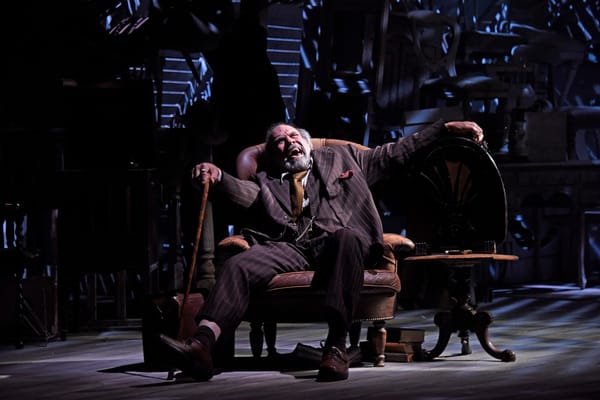Ovid’s Metamorphoses

How many ways can one make age-old tales fresh and exciting? In 80 minutes, international theatre company Pants on Fire tells a selection of stories from Ovid’s epic Metamorphoses: Jupiter transforms his mortal lover Io into a sad cow in a gas mask, Theseus is tended to by a gaggle of giggling nurses in a military hospital, Cupid is a little puppet evacuee who shoots Apollo and Daphne across a party while the gramophone plays in the background.
Peter Bramley’s production transports these mythological tales to the setting of the second world war, with all its associated military costumes, characters and paraphernalia. When Eurydice dies and Orpheus is devastated, he follows her with his lyre, charming all in his way – to the Underworld, which in this case is actually the London Underground. The image of characters emerging from and descending down the escalators of the tube was cleverly done and very funny.
Indeed, the fantastical nature of the show relied on an array of colourful, ingenious props, and a creative use of set. Four whiteboards were moved around between and during scenes to create a changing space, from the interior of a room to waves at sea. Props used were very amusing – as Ariadne sings of her loneliness after Theseus abandons her, cardboard waves move in unison as two puppet fish join in the chorus.
Probably the most memorable story of the show was that of Narcissus, who is recast as a Hollywood heartthrob who falls in love with his own face on screen. Everyone in the audience probably has the image of actor Max Gallagher on screen smiling seductively in different angles seared into their minds. His seductive acting was so funny that when he reappeared on stage later playing the cello for another story, the audience laughed at his very appearance.
It was clear that the cast was having as much fun as we were. The seven actor-musicians move fluidly between roles in different stories, equally adept at playing instruments as singing and being godly. Lucy Egger’s original music was fantastic, helping to tie the otherwise disparate stories together somewhat.
Ovid opened his poem with the phrase “I intend to speak of forms changed into new entities” – and indeed, the stories presented in the show emphasise the transformations between man and nature. Daphne turns into a tree, Narcissus into a flower, Io into a cow. Bramley chose to open his show with the story of Tiresias, Apollo’s prophet famed for his clairvoyance. Tiresias predicts that there will be a war in the future between man and nature, a theme that came across as too didactic and in-your-face by the end of it. It is an important theme, and very relevant today, but the importance of harmony between man and nature could be more subtly dealt with. The ample opportunities offered by the stories of fluid metamorphoses between man and nature were not fully harnessed to bring across the point in a more elegant way.
Ovid’s Metamorphoses has received critical acclaim since its debut at the Edinburgh Fringe in 2010 and then off Broadway in 2011. It certainly does not disappoint.
-4 stars









